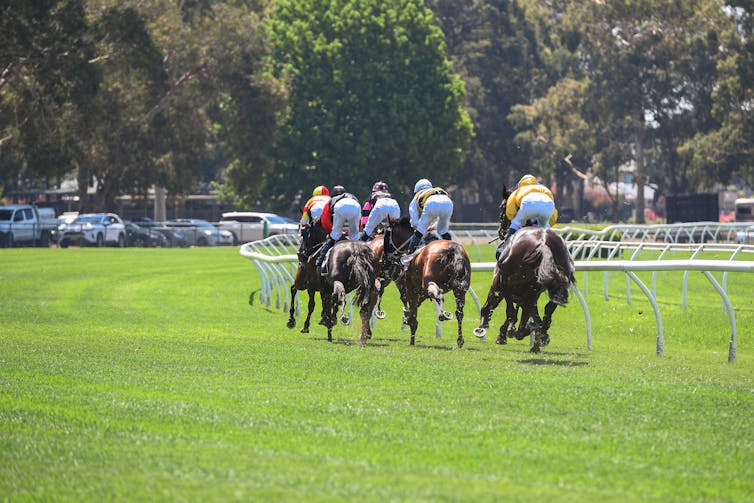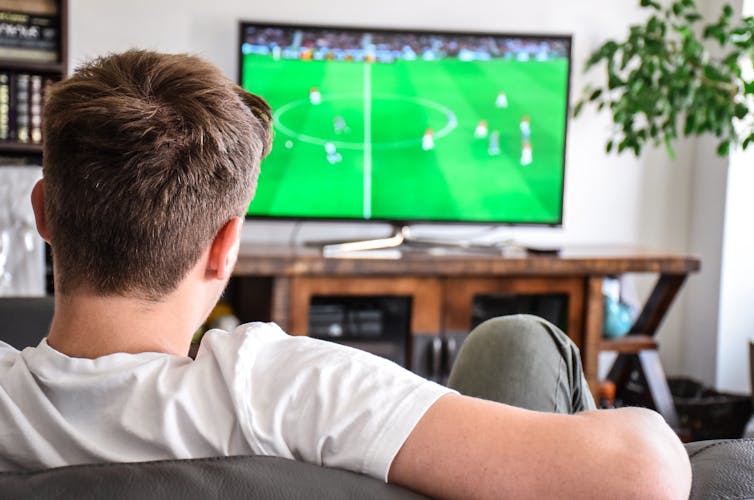Andrew Hughes, Australian National University
If anything is a sure bet right now, it’s corporate Australia’s willingness to use some variation of the ‘for society’s good’ argument.
The most recent example of this is the claim being made, including by federal minister Bill Shorten, that an outright ban on gambling advertising would be disastrous for free-to-air TV.
To be clear, Labor still supports new restrictions on gambling advertisements, including hourly caps and bans during kids’ TV and during and around sports broadcasts.
But it has rejected the idea of a total ban, prompting a backlash extending as far as some of its own backbench MPs.
Speaking on ABC’s Q&A on Monday night, Shorten said Australia’s free-to-air TV broadcasters were in “diabolical trouble”, with many needing gambling ad revenue “in order just to stay afloat”.
“I’m not convinced that complete prohibition works,” he said.
So would our commercial TV networks really fall over tomorrow without gambling ad revenue? Or is something else at play?
Who is buying ads in Australia?
Let’s start by building a bigger picture of where advertising spend more broadly comes from in Australia. Global analytics firm Nielsen regularly compiles top 20 lists of both the categories and individual companies spending the most on ads here.
In 2023, the top category, retail, accounted for A$2.56 billion in advertising spend. Gambling and gaming, in contrast, represented just $239 million, less than a tenth of this figure.

Harvey Norman topped the list of individual companies in 2023. The first we see of any gambling brand is Sportsbet, which came in at 16th.
For gambling companies, it’s fair to assume the lion’s share of this goes to TV. Research by the Australian Communications and Media Authority (ACMA) found 68 per cent of gambling companies’ ad spend went to free-to-air TV markets.
As for the remainder, 9 per cent went to radio, 15 per cent to social media and 8 per cent to other online platforms.
How much is actually getting spent?
But how do we estimate the gambling industry’s total annual advertising spend? There are certainly a lot of numbers getting thrown around.
One source put it at $300.5 million for 2022.
More recently, the ACMA published detailed figures for the period between May 2022 and April 2023, which put it at just over $238 million, with $162 million of this going to free-to-air TV networks.
But the way advertising is classified – what defines an advertisement – can sometimes differ between agencies. Then there is the number of brands operating, which is constantly changing.
In a market with so many competitors, any new entrant needs to spend big on advertising just to capture enough market share to be viable.
This is why I argue that the actual figure for financial year 2023 may be slightly higher than ACMA’s widely quoted figure, accounting for the big ad spend of new entrants that may have fallen outside the time window assessed.
Based on average company ad spend as a percentage of revenue and the size of the gambling industry, I estimate it could be higher, in the ballpark of $275 million.
How much is that to the networks?
This exercise is all about putting these figures in context.
Channel Seven, for example, brought in $1.5 billion in revenue in 2023. Even if it had received the gambling industry’s entire ad spend at my higher estimate of $275 million, this would still account for less than 20 per cent of its annual turnover.
If that money all went to TV ads, Channel Seven’s stated 38.5 per cent share of television advertising revenue would put its revenue from the estimated sports betting advertising at about $106 million in this example, around 7 per cent of its total annual revenue.
Losing most of that would hurt, but wouldn’t mortally threaten the business.

A total ban would most likely be phased in over a number of years, not enacted overnight.
Australia’s free-to-air networks would adapt, restrategise, and find and develop new markets to replace that revenue. Their management teams are far too smart to just shrug their shoulders and take a revenue hit on the corporate chin.
Networks have had plenty of time to adapt
Just a refresher. LinkedIn is now more than 20 years old. Facebook is 20. YouTube is 19. X (formerly known as Twitter) is 18. TikTok is seven.
If free-to-air TV’s business model is so glacial it can’t function in the digital age, it probably doesn’t deserve to be operating in the big leagues.
Digital is here and has been for a while now. The media industry has borne the brunt of this change, but has also had the most time to adapt to the disruptors, who are now more established oligopolies and duopolies than ‘cool start-ups’ out of Silicon Valley.
The argument that we need to protect sports gambling ads to protect the big media brands – has little to no basis. It’s a worn out argument we’ve seen time and time again – big tobacco, I’m looking at you.
Protecting the interests of corporate Australia at the cost of society itself is a gamble none of us should be prepared to take.
Andrew Hughes, Lecturer, Research School of Management, Australian National University
This article is republished from The Conversation under a Creative Commons licence. Read the original article.
Do gambling ads on TV annoy you? Should there be rules around their use? Let us know in the comments section below.
Also read: How to help a loved one with a gambling addiction


If it can be done for Tobacco and related products, why can’t it be done for Sports Betting ???
Totally agree!
What rubbish from the Government. Many Politicians at all levels gave the same lame excuses well knowing they were just mouth puppets to the tobacco companies. Same excuses blah blah blah.
Maybe ask Peter Garrett about his experience with the AHA when it came to anti pokies.
Gambling can be a lot more destructive than tobacco, alcohol and illegal drugs.
Gambling. It destroys whole families and communities.
In Australia about $25 billion was lost on legal forms of gambling in 2018-19.
gambling companies and their lobby groups donated $2.165 million to Australia’s major political parties in 2021-22 representing a 40 per cent increase on the previous year, an analysis of disclosure returns published today by the Australian Electoral Commission (AEC) shows.
How many employees have stolen millions to support smoking or alcohol addition.
Any politician opposing a total ban on gambling should seriously be investigated.